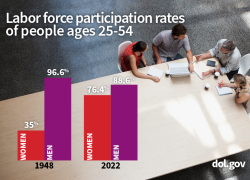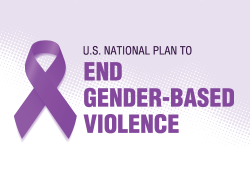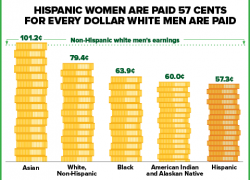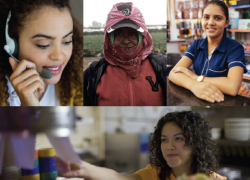Women’s Bureau Director Wendy Chun-Hoon calls grantmaking one of the agency’s “superpowers” – and indeed, we use grants to drive change by funding community-based organizations to:
- Welcome more women into apprenticeships, pre-apprenticeships and nontraditional occupations that lead to good-paying jobs.
- Improve conditions in the industries that are most likely to employ women.
- Address women’s disproportionate responsibility for care work, both paid and unpaid.
- Ensure that all workplaces are free of gender-based violence and harassment.
Below is a preview of three of our recently awarded grants:

Women in Apprenticeships and Nontraditional Occupations (WANTO) grants
We announced the seven recipients of our 2023 WANTO grants earlier today. At $5 million, this is our largest award of WANTO grants, a 47% increase from 2022. WANTO funds programs that recruit, mentor, train and retain women in quality pre-apprenticeship and apprenticeship programs, resulting in career pathways to jobs that are well-paid and often unionized. To further racial and other forms of equity, grantees are encouraged to target women from historically underrepresented communities.
One of the innovations of WANTO is that grantees can use up to 25% of their funds to cover support services like child care for pre-apprentices enrolled in their programs. We've seen firsthand how access to child care can make all the difference in program retention.

Tradeswomen Building Infrastructure (TBI) grant
Similarly, the TBI grant furthers efforts to create pathways for women into two nontraditional industries: infrastructure and clean energy. These industries are expected to see a jobs boom under the Biden-Harris administration’s “Investing in America” plan, but they are currently heavily male-dominated. The TBI grant recognizes that to increase equity and women’s inclusion in these fields, training programs and employers must address women’s care responsibilities as well as gender-based violence and harassment in the workplace.
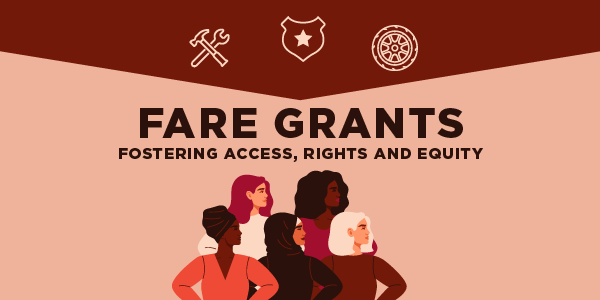
Fostering Access, Rights and Equity (FARE) grants
FARE grants are designed to improve conditions in the jobs that women already hold, particularly when it comes to gender-based violence and harassment. Using FARE funding, five grantees will work across 14 states to build awareness of gender-based violence and harassment in the world of work, connect women workers and survivors to their workplace rights and benefits, and implement worker- and survivor-driven strategies to shift workplace norms and culture.
This year’s grantees will serve immigrant women, migrant women, women of color and domestic violence survivors, as these are some of the groups particularly harmed by the impact of gender-based violence and harassment in the world of work.
Grants are a critical component of the Women’s Bureau’s efforts to advocate for women in the workforce. We are grateful to be able to use our grantmaking “superpower” to support organizations around the country that are doing groundbreaking work to improve wages and working conditions for women.
Learn about all Women's Bureau grants.
Eleanor Delameter, Ashlyn King, Kate Miceli and Elyse Shaw are policy analysts in the Labor Department's Women’s Bureau. Follow the Women’s Bureau on social media.

 U.S. Department of Labor Blog
U.S. Department of Labor Blog
